"Enemies foreign and domestic."
In July of 1775, General Washington appointed
Dr. Benjamin Church as the first surgeon general of the Continental Army.
Three months later,
Washington discovered
Dr. Church had been spying for the British, writing coded messages addressed to British officer, Major Crane.
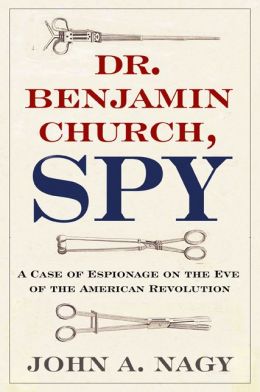 Washington
Washington informed the Continental Congress, October 5, 1775:
"I have now a painful tho' a Necessary Duty to perform respecting
Doctor Church, Director General of the Hospital."
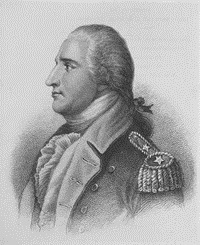
Another of the most notorious stories is that of
Benedict Arnold.
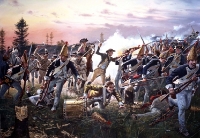
Benedict Arnold was one of America's most popular leaders for capturing Fort Ticonderoga with Ethan Allen, and for leading a daring charge at the Battle of Saratoga, though he disobeyed an order.

A court-marshal cleared
Benedict Arnold of wrong, but his loyalist wife,
Peggy Shippen, felt the Americans did not appreciate him.
Peggy Shippen was the daughter of a prominent loyalist family in Philadelphia.
Arnold incurred much debt trying to maintain the lifestyle his wife was accustomed to.
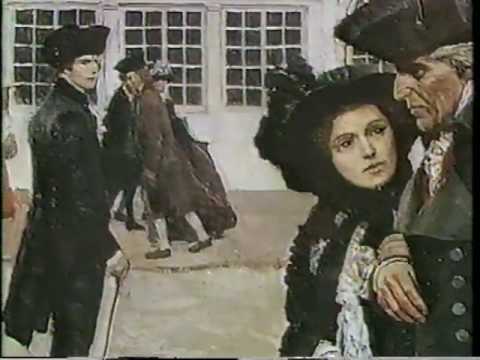 Peggy
Peggy maintained a relationship with a British spy in Philadelphia named
Major John Andre.
In 1779, she finally got her husband to make contact with him.
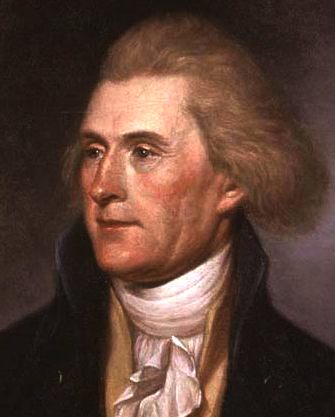
Meanwhile, in 1779, the Continental Congress declared a Day of Public Prayer to Almighty God.
Virginia Governor Thomas Jefferson observed this by signing a State Proclamation of Prayer:
"Congress ... hath thought proper ... to recommend to the several States ... a day of public and solemn Thanksgiving to Almighty God, for his mercies, and of Prayer, for the continuance of his favour ...
That He would go forth with our hosts and crown our arms with victory;
That He would grant to His church, the plentiful effusions of Divine Grace, and
pour out His Holy Spirit on all Ministers of the Gospel;
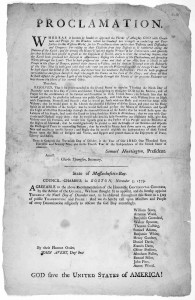
That He would bless and prosper the means of education, and
spread the light of Christian knowledge through the remotest corners of the earth ...
I do therefore ... issue this proclamation ... appointing ... a day of public and solemn thanksgiving and prayer to Almighty God ...
Given under by hand ... this 11th day of November, in the year of our Lord,
1779 ...
Thomas Jefferson."
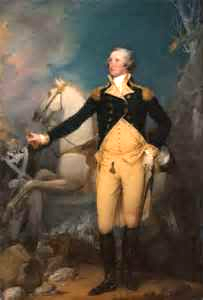
The next spring, April 6, 1780,
General Washington issued the order from his headquarters at Morristown, New Jersey:
"Congress having been pleased by their Proclamation of the 11th of last month to appoint Wednesday the 22nd instant to be set apart and observed as
a day of Fasting, Humiliation and Prayer ...
there should be no labor or recreations on that day."
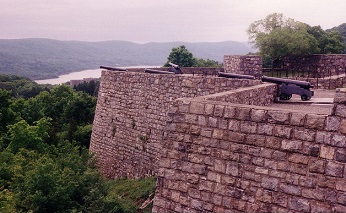
On August 3, 1780,
General Benedict Arnold was put in charge of the fort at West Point, New York, designed by the Polish freedom fighter Tadeusz Kosciuszko.
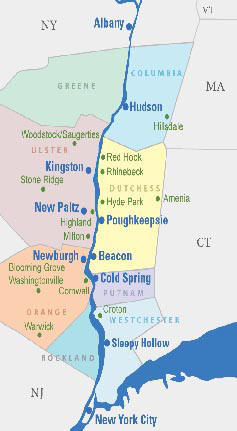
West Point controlled the Hudson River Valley, which stretched from near Canada in the North to New York City in the south.
The Hudson River Valley effectively divided colonial America in half, with the New England Colonies on the east and the Middle & Southern Colonies on the west.
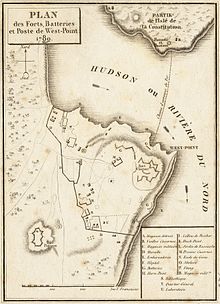
The surrender of West Point would have split the country and possibly cost the Americans the War.
By AUGUST 30, 1780,
General Benedict Arnold determined to betray West Point.
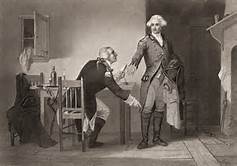
He met with British spy
Major John Andre and conspired with British General Henry Clinton to surrender West Point for 20,000 pounds, equivalent to a million dollars today.
 DVD Vol. 2- Miracles in American History (Episodes 11-20)
DVD Vol. 2- Miracles in American History (Episodes 11-20)
 Benedict Arnold
Benedict Arnold intentionally weakened West Point's defenses, neglected repairs and removed supplies, all the while complaining to General Washington of shortages.
General George Washington and Major-General Lafayette planned to travel to West Point to inspect its defenses.
Benedict Arnold arranged to surrender West Point on that very day, insuring General Washington's capture.
On September 19, 1780, British General Henry Clinton had left Charleston, South Carolina, and was readying his troops to capture West Point.
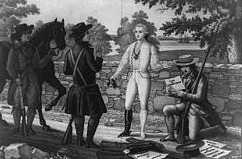
On September 23, 1780, British spy
Major John Andre met with
General Arnold and, dressed as a civilian, headed back to the British lines.
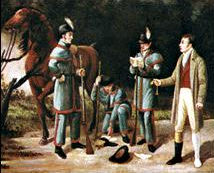
Providentially, some American sentries spotted him in the woods and stopped him.
With unusual curiosity, the sentries searched him once, then twice, and just before letting him go, they decided to search him a third time, making him remove his boots.
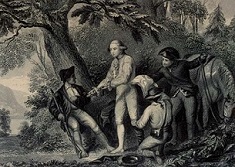
There, in the heel of
Andre's boot, they found the folded up map of West Point, with instructions on where to attack.
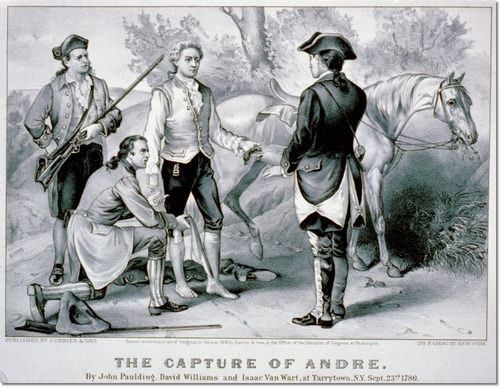
The American sentries arrested
Andre and immediately sent word to
General Benedict Arnold, who was waiting for General Washington to arrive for breakfast.
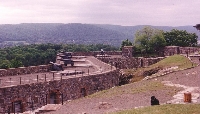 Major James McHenry
Major James McHenry, for whom Fort McHenry was later named, was riding ahead to let Arnold know that Washington had been delayed but was on his way.
By the time Major McHenry arrived,
Benedict Arnold had fled, as his plans were uncovered.
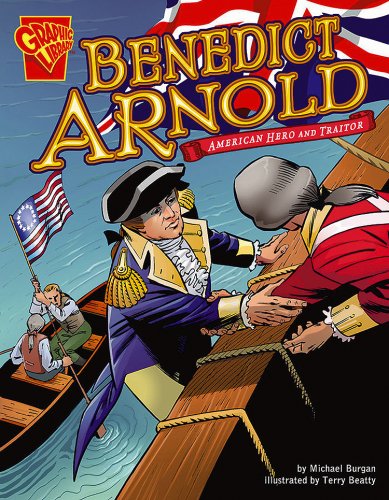 Arnold
Arnold escaped to the British ship
HMS Vulture.
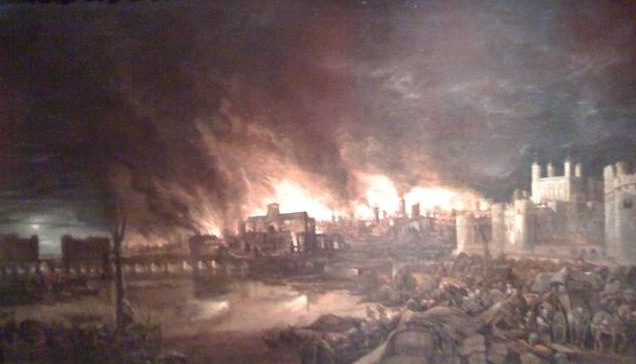 Arnold
Arnold joined the British ranks and later fought against Americans, even
burning the city of New London, Connecticut, in 1781.
Washington offered to do a prisoner exchange. He would return
John Andre to the British in exchange for
Benedict Arnold. The British refused.
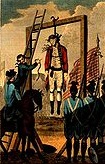
The Continental Army hung
British Major John Andre as a spy, as the British had earlier hung the 21-year-old American spy Nathan Hale.
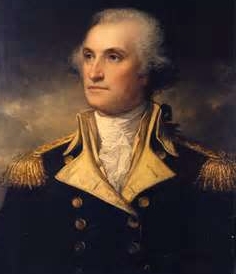
General Washington's order, September 26, 1780, likely penned by his
aide-de-camp Alexander Hamilton, stated:
"
Treason of the blackest dye was yesterday discovered! General Arnold who commanded at West Point, was about to ... give the American cause a deadly wound if not fatal stab.
Happily the treason had been timely discovered to prevent the fatal misfortune.
The providential train of circumstances which led to its discovery affords the most convincing proof that
the Liberties of America are the object of divine Protection."
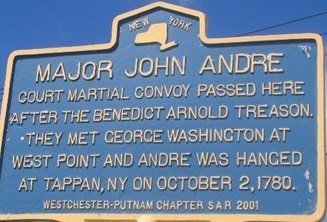
On May 8, 1783, Yale President Ezra Stiles stated:
"A providential miracle at the last minute detected the treacherous scheme of traitor
Benedict Arnold, which would have delivered the American army, including George Washington himself, into the hands of the enemy."
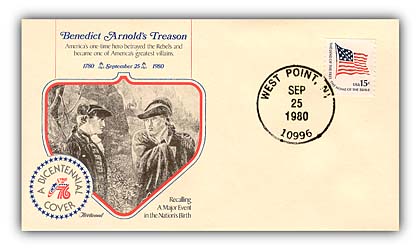
The Continental Congress issued a Day of Thanksgiving, October 18, 1780:
"In the late remarkable interposition of His watchful providence, in the rescuing the person of our Commander-in-Chief and the army from imminent dangers,
at the moment when treason was ripened for execution ...
It is therefore recommended ... a Day of Public Thanksgiving and Prayer ... to confess our unworthiness ... and to offer fervent supplications to the God of all grace ... to cause
the knowledge of Christianity to spread over all the earth."
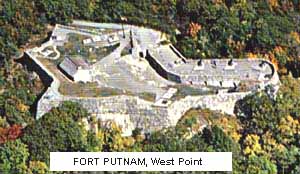
John Jay, who was later appointed by George Washington as the first Chief Justice of the Supreme Court, stated September 8, 1777:
"This glorious revolution ... is distinguished by so many marks of the Divine favor and interposition ... in a manner so singular, and I may say miraculous, that when future ages shall read its history they will be tempted to consider a great part of it as fabulous ...
Will it not appear extraordinary ... like the emancipation of the Jews from Egyptian servitude."